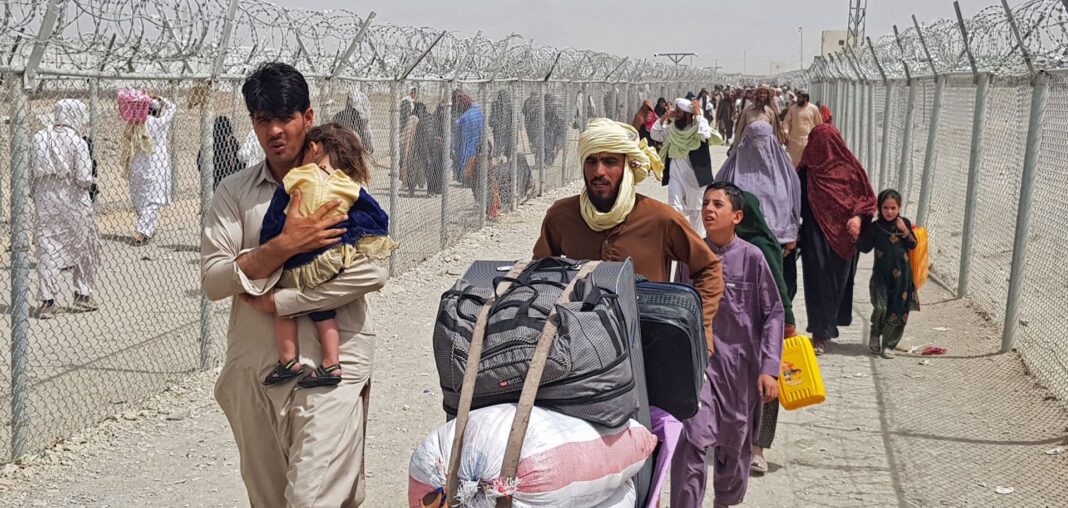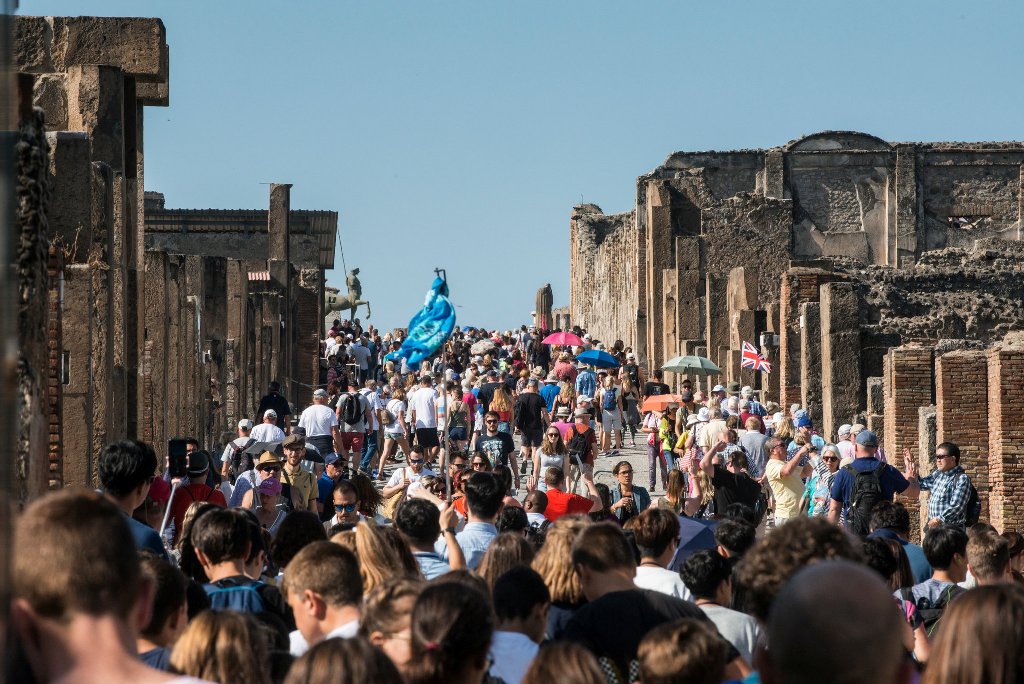The first time Azaan made the jump across the wall, he broke his arm. Braving the 20ft (6m) drop into a wide trench below is, for many Afghans, the only way to cross into Turkey from Iran – and yet hundreds risk it each day.
“I was in severe pain,” the former Afghan army officer told the BBC.
“Several others had broken limbs. The smuggler left us here and told us to run in the direction of the lights of Van city. Many of us were fading out of hunger. I fainted.”
The wall – which stretches for nearly 300km (185 miles) – was built to prevent illegal crossings, and is patrolled constantly by Turkish border forces.
Jumping off it is among the first of a series of extraordinary risks Afghan migrants take as they cross continents, countries and seas to reach the UK and other countries in Europe.
Over the past year, fleeing their country has become more perilous than ever before for Afghans, because Pakistan, Iran and Turkey have intensified their crackdown on illegal migration from Afghanistan along their borders, and have also carried out mass deportations.
Azaan couldn’t continue. He was in pain, and had barely eaten in days. The migrants were given just one boiled egg every morning and a cup of rice in the evening by smugglers who’d charged them nearly $4,000 (£3,150) for the journey to Europe.
“I had two friends – we had made a promise to not leave each other,” he says. His friends tied scarves around him, hoisted him up the wall, back into Iran. Iranian police deported him to Afghanistan.
It was Azaan’s second failed attempt. The first time he returned from the Afghanistan-Iran border because he’d taken his wife and young children along, and he realised they wouldn’t be able to endure the journey.
Azaan didn’t give up. Roughly a year later, once his arm had healed, he made a third attempt.
“I had sold my house earlier. This time I sold my wife’s jewellery,” he says.
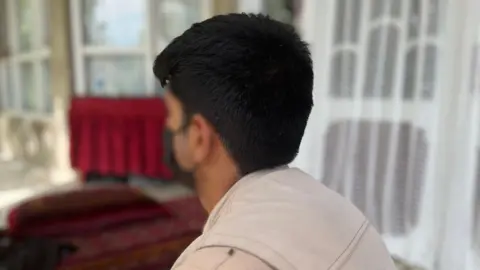 BBC/Imogen Anderson
BBC/Imogen AndersonIn exchange for the money, migrants like Azaan are promised a route to Europe, handed over from one people smuggler to another along the way.
Back at the wall, the smuggler placed a ladder on the Iranian side, and cut the razor wire at the top to create a path for migrants.
“There were 60 to 70 of us,” Azaan recalls. “We climbed to the top and then the smuggler told us to jump.”
For the law and politics graduate, who served his country and led a dignified, comfortable life until August 2021 when the Taliban seized power in Afghanistan, it is a humiliating situation to be in.
In its three years in power, the Taliban government has imposed increasing, brutal restrictions on women. According to the UN, a third of the country’s people don’t know where their next meal will come from. And those who worked for the former military fear reprisal.
“The people I fought against for 20 years are now in power,” he explains. “Our lives are in danger. My daughter won’t be able to study once she turns 13. And I have no work. I’ll continue to try to leave even if it costs me my life.
“Here we are dying every moment. It’s better to die once, for good.”
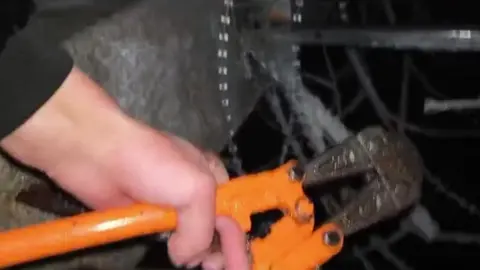 Handout
HandoutAzaan is now back in Kabul with his family. The third attempt to flee ended with a beating and deportation.
“They beat me with the butt of a gun. One boy was hit on his genitals. He was in a terrible state. An old man’s leg was broken. There was a corpse in the trenches in Turkey. This is what I saw. But Iran is also treating us badly. I know Afghans have been severely beaten in Iran too,” he says.
After weeks of digging through people smuggling networks, the BBC established contact with an Afghan smuggler in Iran, aiming to get an insight into the increased dangers Afghans are facing.
“Iranian police are shooting a lot at the border with Afghanistan. One of my friends was killed recently,” the smuggler says, speaking to us over the phone from Iran.
In October, Iran was accused of firing indiscriminately at Afghans crossing over into Iran’s Sistan province from Balochistan in Pakistan. The UN has raised concerns and called for an investigation. The BBC has seen and verified videos of the dead and injured.
Sistan-Balochistan is one of the major routes taken by Afghan migrants to enter Iran, but given the increased risks as well as Pakistan’s mass deportation of Afghans, many are now opting for other routes, in particular, Islam Qala in Afghanistan’s Herat province.
Once in Iran, migrants move to Tehran before going towards the Macu or Khoy counties, to attempt the crossing into Turkey, handed over from one smuggler to another.
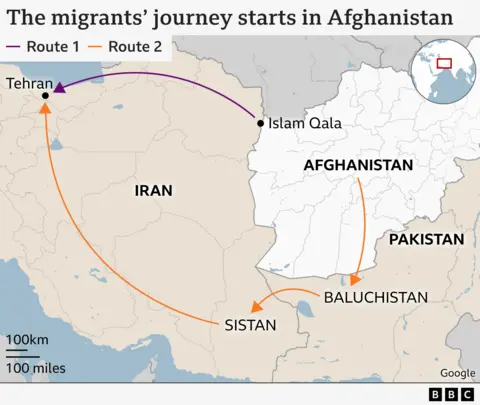
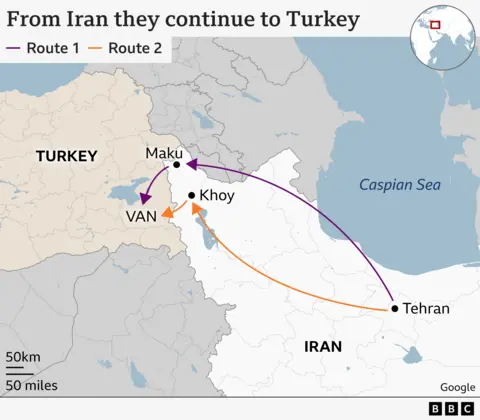
The Afghan smuggler says he hides migrants near the border wall, and then they wait until there’s less patrolling of a portion of the border wall to take a shot at the “game”. He carries a ladder, and a wire cutter to cut the razor wire at the top of the wall and make a path for migrants. He says crossings have become extremely challenging in recent months.
“The Turkish police catch 100 to 150 migrants every night. They have no mercy on them. They break their arms and legs,” he says.
The BBC has put the allegations to the governments of Turkey and Iran but has not yet received a response.
We asked the smuggler how he can justify his illegal business which endangers the lives of Afghans, while charging them thousands of dollars.
“We don’t force people to take these risks. We tell them that whether they get to their destination is 99% in God’s hands, and they could get killed or imprisoned. I don’t believe I’m guilty. What are we supposed to do when people tell us their family is going hungry in Afghanistan?” the smuggler says.
Those who make it past Turkish security forces move from Van towards Kayseri city and then to the Izmir, Canakkale or Bodrum coasts – the next point of peril on the migrant trail.
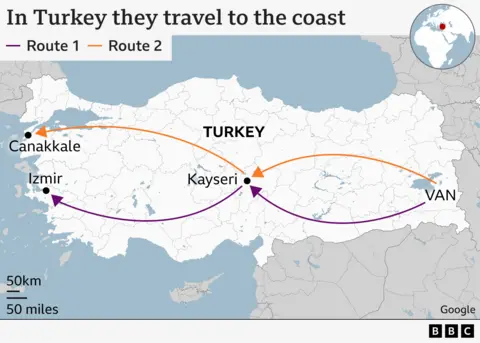
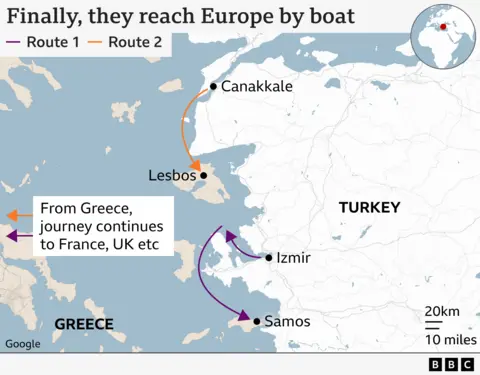
In Kabul, an elderly father took us to the grave of his son. In his twenties, Javid was a former soldier. Fearing for his life in Taliban controlled Afghanistan, he fled the country in an attempt to make it to the UK.
In March this year, he was among 22 people killed after the rubber dinghy they were in sank in the Aegean sea near Canakkale in Turkey, as they attempted to get to Greece. His pregnant wife was also among the 46 people squeezed on to the boat. They both managed to swim to the shore, but he died of hypothermia.
“From Istanbul, smugglers took us to Esenyurt. From there we were packed into cars like animals. We were dropped off in a forested area. We walked through it for four hours and then we reached the coast from where we were put on the boat,” Javid’s wife says, speaking to us over the phone from Turkey where she’s still living.
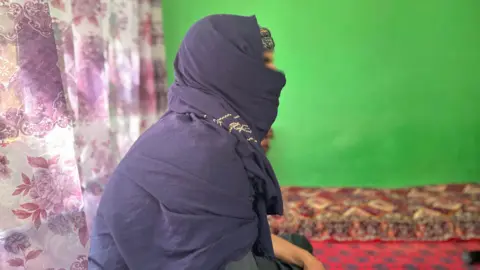 BBC/Imogen Anderson
BBC/Imogen AndersonIn Kabul, Javid’s father broke down inconsolably as he showed us photos of the young man with short black hair wearing track pants and a sweatshirt, posing on a park bench.
“Even now when I remember him the grief is such that it’s only with God’s blessing that I survive the torment,” he says.
He believes that foreign countries which fought in Afghanistan bear responsibility for what is happening to Afghans like his son.
“We fought alongside them in the war against terrorism. If we had known we would be betrayed and abandoned, no one would have agreed to join hands with foreign forces.”
According to the UN, Afghans are among the top asylum seekers in the world, and in the UK they are the second largest group arriving in the country in small boats, another journey fraught with peril.
The UK has two resettlement schemes for Afghans. One is for Afghans who worked directly for the British military and British government, and under the second scheme – the Afghan Citizens Resettlement Scheme (ACRS) – those who assisted the UK efforts in Afghanistan, stood up for values of democracy, women’s freedoms and people at risk can be eligible for relocation.
But after the first phase of evacuation in 2021-22, progress has been extremely slow.
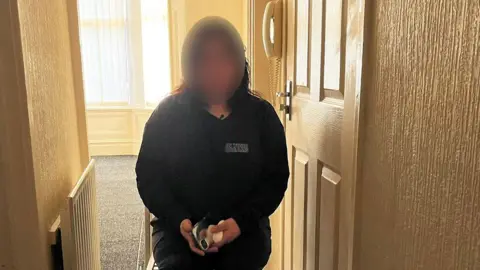 BBC/Imogen Anderson
BBC/Imogen AndersonThis means women like Shahida, who worked in the former parliament of Afghanistan and participated in street protests against the Taliban after they seized power, could not find timely legal routes out of the country. Shahida feared the threat of detention and torture by the Taliban government in Afghanistan every day.
She arrived in the UK in a small boat in May this year, having begun the journey out of Afghanistan more than two years ago. Now in Liverpool, she has applied for asylum.
“I come from a well-known and well-respected family. I’ve never done anything illegal in my life. When authorities would apprehend us during the journey, I would look down out of shame,” she says.
Shahida describes how she crossed the English Channel on an inflatable dinghy, packed in with 64 people. This year has been the deadliest year for migrant crossings across the Channel. More than 50 people have died.
“There was water up to my waist. And because our guide lost the way we floated for hours. I thought this was going to be the end of my life. I’m diabetic so I had to urinate sitting there. And because I was thirsty I had to drink the water I had urinated in. Can you imagine? In Kabul I had everything. My whole life has been taken away from me because the Taliban took over,” she says.
Back in Kabul, Azaan, the former military officer, now wants to sell a small patch of land, the only asset he has left, to gather money to make another attempt.
“This is the only purpose of my life now, to get myself to a safer place.”
All names have been changed.
Additional reporting by Imogen Anderson and Sanjay Ganguly. -Source: bbc.com/news

